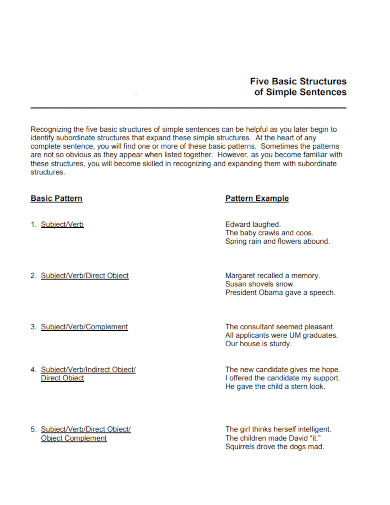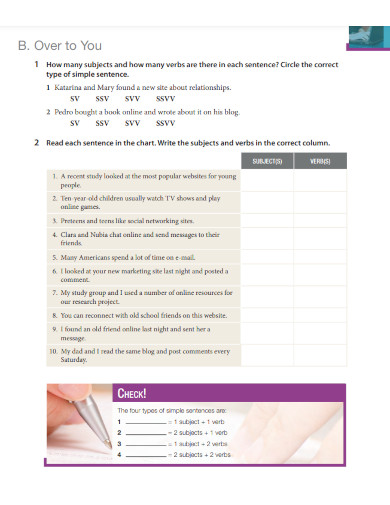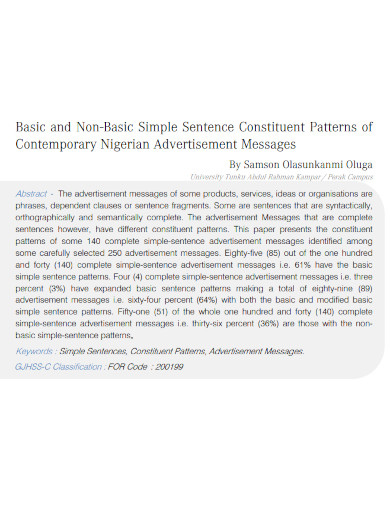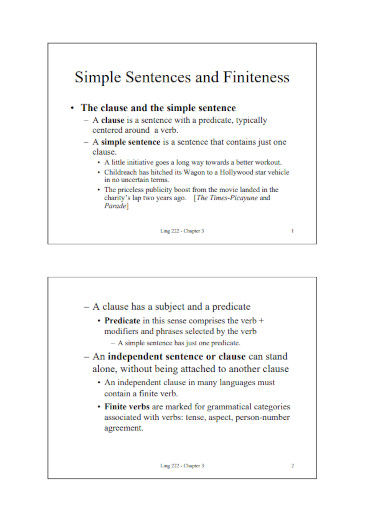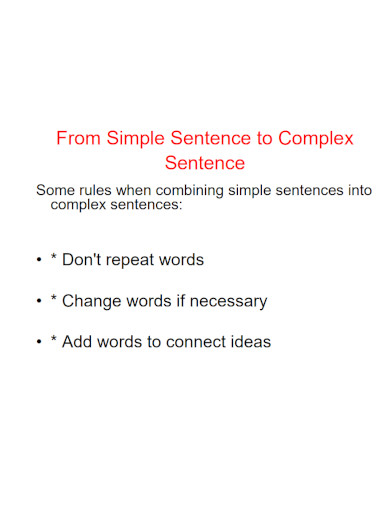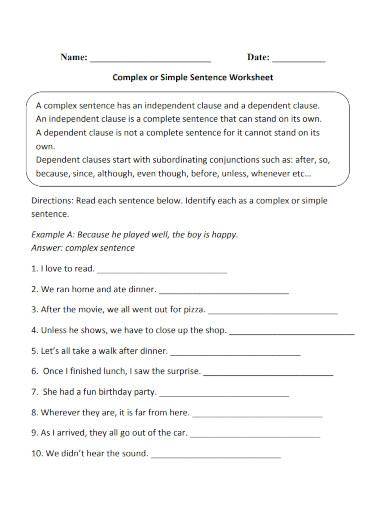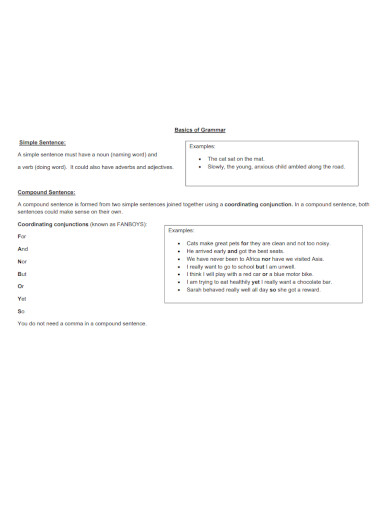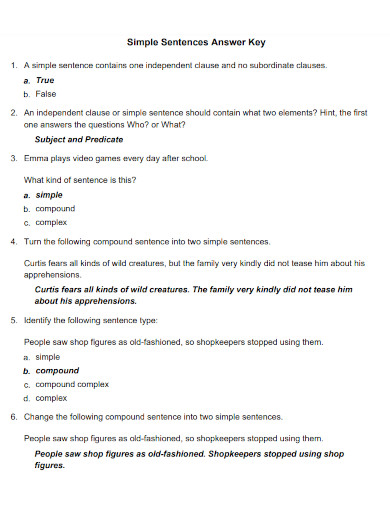24+ Simple Sentence Examples

A sentence is a set of words formed to express a thought or an idea. A sentence structure is composed of at least one subject, predicate, clause, phrase, and modifier. There are four kinds of sentences according to structure, these are simple sentences, compound sentences, complex sentences, and compound-complex sentences. In this article, we would be focusing more on the basic kind of sentence according to structure and that is the simple sentence. You may also like writing templates.
Although simple sentences are often short, they can be longer if they have additional detail and description.
What is a Simple Sentence?
A simple sentence is composed of the most basic elements that complete a sentence which is a subject and a verb.
Simple sentences are called as it is because it can only consist of one subject and one verb or predicate. A predicate is a part of a sentence or clause that contains the verb.
A simple sentence is composed of a single independent clause with a subject and a verb or predicate that expresses a complete thought or idea.
Simple sentences must only have one subject-verb combination but it does not mean that a subject could not have one or more element.
There are a lot of misconceptions about simple sentences and one of it is that simple sentences could not be long enough than five words. A simple sentence is ‘simple’ and not ‘short’, it is not defined by the number of words used in order to make up a single simple sentence. A simple sentence could be short but expresses complicated thought or idea and it could also be lengthy with an uncomplicated thought or idea. You may also see the writing examples in Doc.
What Makes a Simple Sentence?
You might think that a simple sentence is not complicated since the term says it all: simple sentence. A simple sentence is not necessarily short in order to be considered simple. But do not get too confident because it can get as complicated that in grammar exams, you might take simple sentences as a compound or a complex one. Simple sentences can be longer because it depends on whether it has compound subjects, verbs, and even prepositional phrases. But here’s the catch, simple sentences should never have a dependent clause. A dependent clause is composed of a subject and a verb but it does not mean that it could already create a complete thought or idea, therefore, it cannot stand alone enough to be comprehensive.
What Makes Up a Simple Sentence?
In order to write a simple sentence, the following should always be included
- Must have a subject and a verb
- Must express a complete idea or thought
- Must only have one clause (the independent clause)
Examples of Simple Sentences
There various ways a simple sentence can be constructed. Here some examples:
1. Simple sentences can consist only of one word.
Examples:
- Go.
- Run!
- Fly.
- Bark!
- Bite!
- Stop!
- Who?
- What?
- Where?
- When?
- Why?
- How?
Most of the simple sentences cited in the list of examples are imperative, which is a kind of sentence that gives commands. And the others are also interrogative ones, which is a kind of sentence that asks. You might insist that a sentence must always contain a subject and a verb. However, in the case of this kind of sentence, it is automatically assumed that the subject is you or the person the imperative is being told to. You may also like the personification examples.
2. Simple sentences can be formed using intransitive verbs.
Examples:
- Jack writes.
- Vices kill.
- Change comes.
- It rained
- She grew up.
- Love perseveres.
- The man stood up.
- A dog barked.
- The tree branch broke.
- The glue sticks.
- Reese vomited.
- My horse ran.
An intransitive verb does not take a direct object or who or what received the action.
3. Simple sentences can be longer than three words.
Examples:
- You are only as good as their first impression of you.
- Perching on a branch, the eagle shrieked.
- Little Red Riding Hood was carrying a basket of flowers is going to her grandmother’s house.
- Taylor Swift is one of the first singers to sell an album in its first day of release.
- Look at the dust and grime stuck in his white cotton pants.
- We have declined the request of the arrogant client.
- Moving up the social class brings unfortunate consequences.
- The famous artist broke up with his girlfriend just recently.
- Our memories should stay in the past.
- Your time limit has long been up.
- Can you give me your blanket?
Simple sentences are not limited to one or five words because it can go beyond that. Just make sure that in constructing simple sentences longer, always see to it that it only has one independent clause. You may also like metaphor examples.
4. A simple sentence could have compound subjects and compound verbs.
Examples:
- Jack and Jill went up to the hill.
- Snow White and Cinderella danced the night away.
- Justin sings and dances in the studio room every single day.
- The management and staff apologized for their misconduct.
- Both brother and sister play computer games after school.
- The dog and the cat played and fought all in the same moment.
- I prefer riding and struggling in tight public vehicles.
- The tree branch snapped and broke all at once.
- Biology and geology are both my favorite subjects in school.
- He displayed and sold the limited edition robots for a smaller price.
- The dancers and the singers performed their heart out last night during the concert.
- Both the movie actors and the theater actors performed and executed the same story magnificently.
More Examples of Simple Sentences
1. Alice ran to the stadium.
2. Brent and Ben are going hunting tomorrow morning.
3. The dysfunctional went straight down in the ocean.
4. Can you lend me your ears?
5. Our local delicacies smell appetizing.
6. An eagle perches on the giant tree’s branch.
7. Look below the wardrobe for the hidden stash of cash.
8. The printer is out of ink.
9. Will you call me at my new number?
10. The festival was too crowded and rowdy for me.
11. I cannot sing high-pitched songs.
12. A night without stars feels sad and lonely.
13. The student hates to take exams in the afternoon.
14. The bus arrived late
15. The dedicated office worker reports to the office extra early daily.
16. The twin babies Liza and Lira cried and thrashed around.
17. I eat my dinner at exactly 6:00 a.m. daily.
18. The bag of ice melted quickly than expected.
19. Surprisingly, Paul does not drink beer or any kind of alcoholic beverages.
20. The robotics team worked hard and produced a high-functioning robot.
21. The girl ran towards his arms desperately.
22. I stood beside him through thick and thin.
23. The airplane took time to land.
24. The cat chased after the mouse.
25. She claimed her prize yesterday.
Importance of Simple Sentences
Sure, you can communicate effectively with the use of more detailed sentences like that of how detailed compound, complex, and compound-complex sentences are. Simple sentences can be used to communicate to anyone clearly because you don’t have to mention a lot of unnecessary words– you are speaking directly to the point. Communicating in simple sentences can help you highlight the important points or hasten the pace of getting your thoughts to get through the receiver of your message. It also avoids unnecessary information to enter in our heads while missing out on the important ones. You may also like the examples of commonly used prepositions.
How to Avoid Mistakes in Writing Simple Sentences
When you think of it, simple sentences are those that are composed only of a subject and a verb. Simple indeed, right? With this, you may underestimate the construction of these sentences. Probably, you recklessly proceed in composing one since, again, it is simple. However, don’t be fooled. Writing a simple sentence could be complex too. In this task, grammar and spelling are just some of your possible downfall. To help you establish an effectively written simple sentence, here is a simple article to provide you with some tips on avoiding these common errors.
1. Scale yourself.
In writing a simple English sentence, it is important to be aware of your level. If you are still a beginner, don’t rush in writing complicated ones. Put in mind that no one could master a language overnight; thus, it is natural to take a longer time in learning this task. On the other hand, if you have a small knowledge about this language, you can experiment and ask for a friend or the help of different media to help you flourish your understanding.
2. Learn from your weaknesses.
There are certain aspects of writing that a writer performs the worst. Consequently, read your previous compositions and identify the points you see yourself the poorest. By distinguishing your common mistakes, you will provide more space for improvement and open doors for opportunities for you to become a better writer. Assess these weaknesses by asking grammatical guidance from a friend or utilize the Internet for learning. As what the famous line says, practice makes perfect, so slowly work on your weak points.
Moreover, according to Grammarly, here are most of the frustrating mistakes that writers commit:
- Incorrect verb forms
- Subject-verb disagreement
- Run-on sentences
- Comma splices
- Pronoun-antecedent disagreement
3. Conciseness is the key.
Put in mind that simple sentences are only comprised of one subject and one predicate; thus, complex construction of a sentence is not a must. Don’t be so hard on yourself. Hold and organize your thoughts first before writing. Remember that in writing a simple sentence, you write to express, not to impress. Thus, see to it that you understand what you write, and you write only the things that you can write.
4. Read more references.
The more you read, the more you learn. By reading different contexts, you will allow yourself to acquire more knowledge. Get some inspiration from various authors and observe how they compose their own sentences. Since we’re focusing on learning how to avoid mistakes in writing a simple sentence, it is just appropriate to pay more attention to those types of sentences. You can choose any type of reference in this tip. Reading contents that you enjoy is a great way to learn too.
5. Have a knowledgeable person by your side.
This does not indicate that you necessarily have to be together with someone who is an expert writer in person. This simply means that you must befriend or acquaint a grammar-savvy one. By doing this, you can easily ask for some help from them such as a peer review. With good writers surrounding you, learning through their feedback is also a great way to explore the technical side of writing. On the other hand, you can utilize social media by joining various open fora for basic writing.
“You can always edit a bad page. You can’t edit a blank page,” said Jodi Picoult. Pensively, it is natural to commit mistakes at the beginning, but it does not mean that you’ll just have to settle for less. Apply these tips to your composition and allow yourself to learn more. As simple as they may sound, simple sentences will forever be complex to people who will not find ways to learn.


